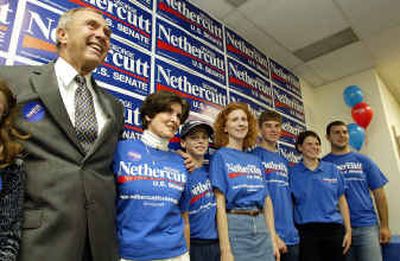Murray, Nethercutt head for showdown

It’s official, but not surprising: Rep. George Nethercutt will face two-term incumbent Patty Murray for the U.S. Senate seat.
Democrat Murray and Republican Nethercutt cruised through their parties’ respective primaries Tuesday. Nethercutt was collecting about seven of every eight votes cast in the GOP primary, while Murray garnered better than nine of 10 Democratic votes.
Murray, who was in Washington, D.C., awaiting a vote on a bill about the nation’s Homeland Security spending, called Nethercutt, who had flown from the nation’s capital to his campaign headquarters in Bellevue, to congratulate him and call for a seven-week campaign on the issues. Nethercutt returned the congratulations, and repeated his call for frequent debates.
Both said they expect the general election campaign to revolve around questions of jobs, the economy, health care and national security. But complicating their campaign schedules will be the fact that no one is sure when Congress will break this fall.
“I would like to be campaigning around the state, but have a responsibility to the voters I represent to be here” in Washington, D.C., Murray said.
Congress still must pass most of the nation’s appropriations bills, and deal with such issues as education and the security of its ports and borders, she said.
“This is the longest I’ve ever seen things delayed,” said Murray, who added Senate leadership wasn’t expecting the session to adjourn until the first week of October. “I’ll do what I’ve always done, be here for votes during the week and come back to campaign on the weekends.”
Her campaign has already begun to criticize Nethercutt for missing votes in the last week, as he stayed in the state after Labor Day to continue campaign appearances. But when a bill on lawsuit reforms, one of his key issues on improving health care, came up for a vote Tuesday, Nethercutt took an early-morning flight back to Washington, D.C., to cast a vote, then flew back across the country later in the day.
“I take my votes very seriously,” Nethercutt said in a telephone interview from his campaign headquarters. “But it’s also important to the state that people have a chance to see me and hear my positions.”
On Tuesday, the Murray campaign agreed to two debates, one in Spokane and another in Seattle.
“I think that’s not enough,” said Nethercutt. He said he’d like to have as many as he had in the 1994 race against then-House Speaker Tom Foley, when they debated nine times over the course of about six weeks.
If the session drags on, he suggested he and Murray could go to a television studio in Washington, D.C., and be hooked up via satellite to questioners and audiences in television stations in Washington state.